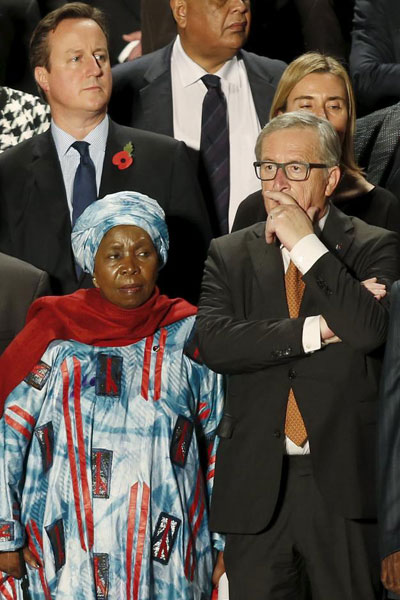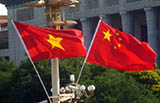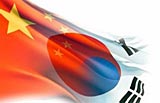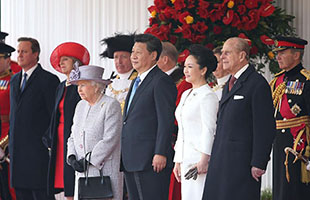EU launches new trust fund for Africa to tackle refugee crisis
(Xinhua) Updated: 2015-11-13 00:09
 |
|
British Prime Minister David Cameron (top L), European Commission Vice-President Federica Mogherini (top R, partly hidden), Nkosazana Dlamini-Zuma, chairperson of the African Union Commission (front L) and European Commission President Jean Claude Juncker (front R) attend the opening ceremony of the Valletta Summit on Migration in Valletta, Malta, November 11, 2015.[Photo/Agencies] |
VALLETTA -- European Commission President Jean-Claude Juncker launched here Thursday an emergency trust fund for providing stability and addressing root causes of irregular migration and displaced persons in Africa.
The signing was held as EU and African leaders met for the second session of the Valletta summit on migration Thursday morning.
The fund will be made up of 1.8 billion euros ($1.93 billion) from the EU budget and the European Development Fund (EDF), to be complemented by contributions from EU Member States and other donors.
Juncker said the fund for Africa, set up at a record speed, showed once more the EU's commitment to swiftly reply to the large challenges people face in the region.
"I want to see more Member States contributing and matching the 1.8 billion euros the EU has put forward," he said.
According to the European Commission, to date, EU Member States' contributions amount to around 81.2 million euros, but the EU expects more contributions to follow.
The trust fund will benefit a wide range of countries across Africa that encompass the major African migration routes to Europe. The countries and regions are mainly the Sahel region and Lake Chad area, the Horn of Africa area and the North of Africa area.
The EU trust fund is in addition to the existing 20 billion euros in development aid the EU and its Member States' give to Africa every year.
Projects that can be financed by the trust fund are job creation programs for young people and women, with a focus on vocational training and the creation of micro and small enterprises. Otherwise, projects which support the reintegration of those returning to their communities.
The fund will assist projects supporting basic services for local populations, projects improving migration management, supporting improvements in overall governance, in particular by promoting conflict prevention and enforcing the rule of law.
It will also fund actions that could contribute to preventing and countering radicalization and extremism.
"In West Africa where 25 percent of the population is from other countries, and they have been integrated and (the situation) is going well," said Cote d'Ivoire President Alassane Ouattara, noting that migrants were not leaving his country, as the economic and political situation was very good, and "that is what everyone should try to do (in that regard)."
The Valletta summit on Nov. 11 and 12 was called by the European Council in April this year to discuss migration issues with African and other key countries concerned. The emergency trust fund for Africa was one of the main deliverables of this summit.
The summit brought together about 63 European and African heads of state or government as well as a large number of international and regional organizations. Leaders also rolled out a 17-page action plan concerning the migration issue.
- Merkel calls for European solution to refugee crisis
- Refugee crisis continues to create rift between pro-Europeans, Eurosceptics
- West responsible for creating refugee crisis
- EU leaders agreed on further steps to tackle refugee crisis
- Root cause of the European refugee crisis
- Promoters of 'Arab Spring' responsible for causing the worsening refugee crisis






